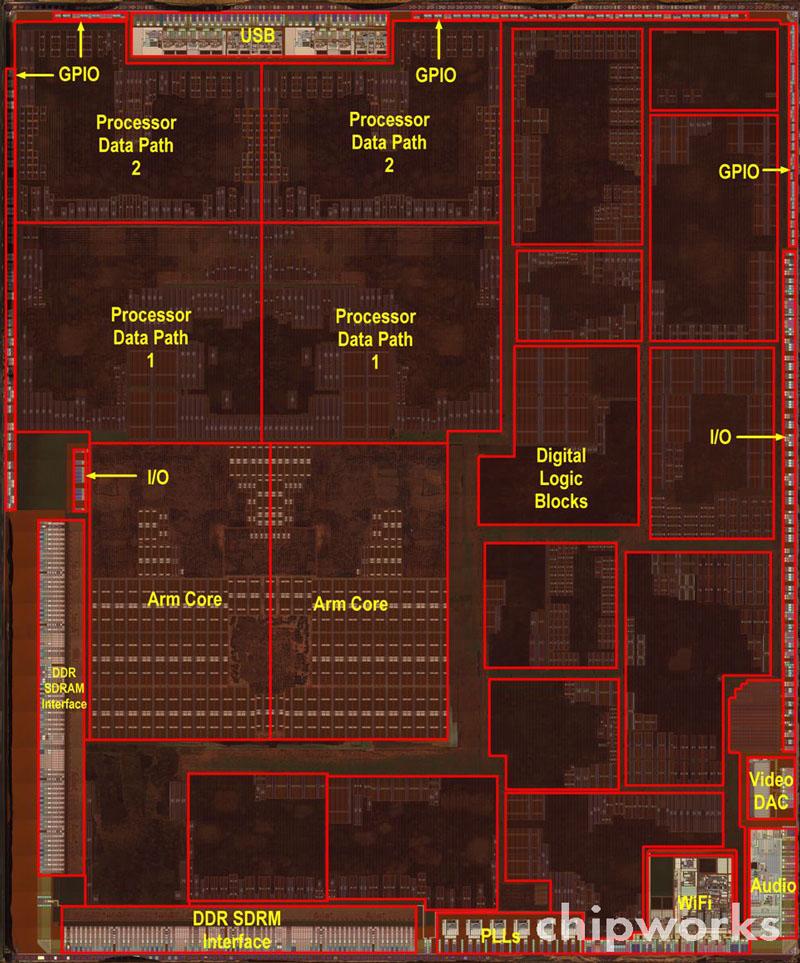Limited RAM in Apple's A5 chip in iPad 2, iPhone 4S motivated by battery life concerns
Apple itself has never announced the amount of RAM built into the iPad or iPhone, forcing curious parties to poke its software and examine X-rays of its chips to arrive at the conclusion that the company's latest A5 chip has the same 512MB as the last generation A4 chip of the original iPad and last year's iPhone 4 (albeit RAM of the faster LPDDR2 type).
Competing smartphones and tablets commonly claim a full GB or more of RAM, which some pundits have identified as an area of superiority over Apple's offerings. In keeping with its tightly controlled, highly secretive design process, Apple has never acknowledged or commented on why the A5 (shown below) has so little RAM on board.
Given the direct historical relationship between available RAM and the sophistication of software a system can run, this has appeared to some as either an engineering failure by Apple, or alternatively an effort to boost margins at the cost of building a better product.
Answer from an unlikely source
However, a Microsoft blog post by Windows lead Steven Sinofsky highlights an interesting answer to a subject Apple itself has left unaddressed. In it, Sinofsky mentions "a key engineering tenet of Windows 8" that involved efforts "to significantly reduce the overall runtime memory requirements of the core system."
While the idea that the operating system should be as efficient as possible with available RAM is certainly not new, Sinofsky then introduced a detailed explanation authored by Bill Karagounis, the group program manager of Microsoft's Performance team, to detail exactly why using less RAM is so critically important.
Karagounis points out that "minimizing memory usage on low-power platforms can prolong battery life," noting that "In any PC, RAM is constantly consuming power. If an OS uses a lot of memory, it can force device manufacturers to include more physical RAM. The more RAM you have on board, the more power it uses, the less battery life you get.
"Having additional RAM on a tablet device can, in some instances, shave days off the amount of time the tablet can sit on your coffee table looking off but staying fresh and up to date," Karagounis wrote.
Windows 8 in 1 GB
In describing Microsoft's goals for getting Windows 8 to run on hardware with the same RAM as today's Windows 7, Karagounis compares the same system with just 1GB installed (the minimum required for Windows), and indicates that a base install of Windows 8 is now consuming just 281MB of available RAM, compared to 404MB for Windows 7.
Karagounis also notes that Windows 8 is actually doing more because it includes Microsoft's "Windows Defender" software intended to catch and block malware. He specifically notes that antivirus software requires a significant amount of RAM to address in working out how to prioritize memory allocation. That means Microsoft's malware issues raise challenges in RAM consumption unique to its platform.
Apple faces similar RAM constraints with its Mac OS X systems, which now also include basic malware software, although far less extensive and sophisticated than that required on Windows, where viruses not only exist in the wild but are very prevalent.
However, Microsoft's comments also pertain to Apple's iOS mobile environment, which is both scaled down and optimized to a much greater extent than even Mac OS X. While Apple's Macs now ship with a minimum of 2GB, Apple's iOS devices currently max out at just 512MB, and battery life is clearly a prime consideration.
Apple's iOS strategy also makes the concept of viruses essentially obsolete, not only because the devices can only obtain signed software from the App Store, but also because the operating system confines apps to their own sandbox. Even if an app were to pack a virulent payload, it simply couldn't deliver it in a way that infects other apps or documents because of iOS' security design. iCloud maintains a similar sandbox between the stored files of various apps.
The mythical half-tablet, half-PC
The comments of Microsoft's engineers also highlight the fallacy of thinking that Windows 8 will be able to usher in a new wave of tablets that can do double duty as light weight, long life iPad-replacements and then switch into high gear to work as full power Windows desktop machines at the owner's whim.
As Karagounis points out, having enough RAM to run a full Windows environment simply makes it impossible to match the efficiency profile of a system that is designed to use less RAM, because the installed RAM chips are going to be bleeding battery life regardless of whether they are being fully utilized or not. Simply having RAM installed means less battery life, a fact punctuated by the battery-sapping tablets running Android 3.0 Honeycomb on 1GB of RAM.
Microsoft's explanation effectively endorses Apple's strategy for designing hardware purpose-built for the task at hand, either with minimal RAM when designed to coast for days as a low power device like the iPad or iPhone, or with enough RAM to do full work, but requiring a recharge after several hours of operation, like Apple's MacBook line of notebooks.
This also further clarifies the idea that next year's ARM-based Windows 8 tablets will need to have minimal RAM to compete with the iPad, and therefore won't be able to run full scale desktop software, regardless of whether developers recompile it for ARM chips. Adding more RAM would not only take a hit on battery life but would also make the systems more expensive, and like Android 3.0 licensees, preclude them from matching Apple's iPad in price.
The Samsung-built, laptop-class tablet hardware Microsoft recently issued to demonstrate its newest build of Windows 8 for developers was initially chided for needing a fan to cool its Intel Core i5 processor, but the most telling detail of the system was that it packed 4GB of RAM, eight times as much as the iPad.
 Daniel Eran Dilger
Daniel Eran Dilger














 Amber Neely
Amber Neely
 Thomas Sibilly
Thomas Sibilly
 AppleInsider Staff
AppleInsider Staff
 William Gallagher
William Gallagher
 Malcolm Owen
Malcolm Owen
 Christine McKee
Christine McKee










70 Comments
Okay, thanks Microsoft. Move along.
Interesting...
"key engineering tenant" ... Is Windows 8 a rental service?
iPhone sure, but the iPad has volumes of unused space that could accommodate a much larger battery to provide the needed power for the additional RAM. It might make it too heavy, but more RAM is better, in my opinion, as long as you can still deliver the long battery life that we currently enjoy on iPad.
"relatively scarce" RAM??? According to whom? Microsoft and the Android community whose half-baked OS's require higher horsepower hardware that suck more battery juice to perform the exact same processes that iOS can do effortlessly with less RAM?
It looks like the PC/Android community is trying to keep an obsolete hardware business model going by using more and more power-hungry components to keep an industry afloat.
Good for Apple that they can do more with less than the competition.